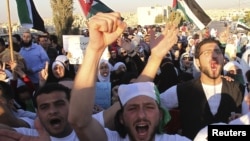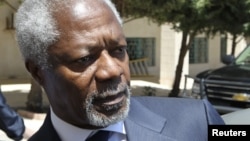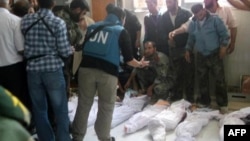The deputy to international envoy Kofi Annan, Jean-Marie Guéhenno, has briefed the U.N.'s 15-nation Security Council on the envoy's visit to Syria, prompting one diplomat to call the current situation a "low point in the conflict."
After Wednesday's closed briefing, Germany's ambassador to the United Nations, Peter Wittig, told reporters that he hoped the "flagrant violations" like the recent massacre in Houla was an "eye opener for some members of the council." He added that Germany is "against the militarization of the conflict."
Mr. Annan left Syria on Wednesday to attend talks with Jordanian officials. A U.N. official said the international envoy did not secure any major steps from the Syrian government to implement a faltering peace plan for the country.
"After 15 months of violence, only very strong signals will have an impact," Guéhenno told reporters. "Small diplomatic steps will not suffice."
Russia's U.N. ambassador, Vitaly Churkin, whose country says it will veto any Security Council resolution that authorizes foreign military intervention in Syria, said after the briefing that Moscow is dissatisfied with the "current state of things."
The U.N. observer mission in Syria confirmed the killings of 13 people in the northeastern province of Deir el-Zour. The mission said U.N. monitors found the bodies late Tuesday, with some of the dead appearing to have been shot in the head from short range and all having their hands tied behind their backs.
U.N. observer chief, Norwegian General Robert Mood, said he is "deeply disturbed by this appalling and inexcusable act." He called on all parties "to exercise restraint and end the cycle of violence."
International community outraged
International outrage has mounted since a massacre of more than 100 civilians took place in the central Syrian town of Houla last week.
Diplomats in Geneva said the U.N. Human Rights Council plans to hold an emergency meeting on Friday to discuss the massacre. They said the United States, Turkey and Qatar led the push for the special session.
Israeli Defense Minister Ehud Barak urged the international community to take tougher action against Bashar al-Assad's government.
"The events in Syria mean the world must take action -- not only by talking, but by acting," Barak said. "These are crimes against humanity, and it is impossible that the international community stand aloof."
The U.S. Treasury on Wednesday announced it will freeze the assets of the Syrian International Islamic Bank to tighten economic pressure on the Syrian government.
Several countries are expelling Syrian diplomats in protest of the Houla massacre. Japan and Turkey announced the step on Wednesday. They joined the United States, Australia, Britain, Canada, France, Germany, Italy, the Netherlands and Spain, which announced the expulsions of Syrian diplomats on Tuesday
Diplomatic blows
The Syrian government retaliated on Wednesday by ordering the Dutch charge d’Affaires to leave Syria within 72 hours.
Russia's U.N. ambassador on Wednesday called expulsions a "bilateral matter," but warned that they could be "misinterpreted by those who want to see foreign military intervention and fighting in Syria."
In Beijing, Foreign Ministry Spokesman Liu Weimin said he is not aware of any Chinese move to expel or disrupt the work of Syrian diplomats in the country. "China opposes military intervention in Syria and opposes regime change by force," Weimin said.
Annan plan 'a real failure'
Annan's plan called on the Syrian government to withdraw heavy weapons from civilian areas and abide by a truce with rebels. But attacks by both sides have continued.
Syrian activists said fighting between government and rebel forces on Wednesday killed at least nine people, five of them in the Damascus suburb of Douma. They said government troops shelled Douma and the central city of Homs, which also is an opposition stronghold. The casualties could not be independently confirmed.
Abu Orouba, a media liaison for the opposition Local Coordination Committees of Syria, told VOA the situation across the country is dire.
"Annan’s plan is a real failure. As a Syrian citizen, I see that it failed to produce any result - actually none of its articles were implemented. Even the cease-fire requirement was not met," Orouba said. "If Annan’s plan is still on the table and the U.N. observers are still on the ground, why did this massacre take place? Why is there no cease-fire?"
Political scientist Alexei Malashenko of the Carnegie Center in Moscow says the situation in Syria is so dead-locked that a solely diplomatic solution is becoming impossible.
“[President Assad] is a nervous man, and, it seems, is so confident in himself that he has gone over the top in his actions,” Malashenko said. “The massacre in Houla is only the beginning; it will continue to get worse.”
VOA Russian Service's Yuliya Appel and Middle East Voices' Mohammed Elshinnawi contributed to this report.
After Wednesday's closed briefing, Germany's ambassador to the United Nations, Peter Wittig, told reporters that he hoped the "flagrant violations" like the recent massacre in Houla was an "eye opener for some members of the council." He added that Germany is "against the militarization of the conflict."
Mr. Annan left Syria on Wednesday to attend talks with Jordanian officials. A U.N. official said the international envoy did not secure any major steps from the Syrian government to implement a faltering peace plan for the country.
"After 15 months of violence, only very strong signals will have an impact," Guéhenno told reporters. "Small diplomatic steps will not suffice."
Russia's U.N. ambassador, Vitaly Churkin, whose country says it will veto any Security Council resolution that authorizes foreign military intervention in Syria, said after the briefing that Moscow is dissatisfied with the "current state of things."
The U.N. observer mission in Syria confirmed the killings of 13 people in the northeastern province of Deir el-Zour. The mission said U.N. monitors found the bodies late Tuesday, with some of the dead appearing to have been shot in the head from short range and all having their hands tied behind their backs.
U.N. observer chief, Norwegian General Robert Mood, said he is "deeply disturbed by this appalling and inexcusable act." He called on all parties "to exercise restraint and end the cycle of violence."
International community outraged
International outrage has mounted since a massacre of more than 100 civilians took place in the central Syrian town of Houla last week.
Diplomats in Geneva said the U.N. Human Rights Council plans to hold an emergency meeting on Friday to discuss the massacre. They said the United States, Turkey and Qatar led the push for the special session.
Israeli Defense Minister Ehud Barak urged the international community to take tougher action against Bashar al-Assad's government.
"The events in Syria mean the world must take action -- not only by talking, but by acting," Barak said. "These are crimes against humanity, and it is impossible that the international community stand aloof."
The U.S. Treasury on Wednesday announced it will freeze the assets of the Syrian International Islamic Bank to tighten economic pressure on the Syrian government.
Several countries are expelling Syrian diplomats in protest of the Houla massacre. Japan and Turkey announced the step on Wednesday. They joined the United States, Australia, Britain, Canada, France, Germany, Italy, the Netherlands and Spain, which announced the expulsions of Syrian diplomats on Tuesday
Diplomatic blows
The Syrian government retaliated on Wednesday by ordering the Dutch charge d’Affaires to leave Syria within 72 hours.
Russia's U.N. ambassador on Wednesday called expulsions a "bilateral matter," but warned that they could be "misinterpreted by those who want to see foreign military intervention and fighting in Syria."
In Beijing, Foreign Ministry Spokesman Liu Weimin said he is not aware of any Chinese move to expel or disrupt the work of Syrian diplomats in the country. "China opposes military intervention in Syria and opposes regime change by force," Weimin said.
Annan plan 'a real failure'
Annan's plan called on the Syrian government to withdraw heavy weapons from civilian areas and abide by a truce with rebels. But attacks by both sides have continued.
Syrian activists said fighting between government and rebel forces on Wednesday killed at least nine people, five of them in the Damascus suburb of Douma. They said government troops shelled Douma and the central city of Homs, which also is an opposition stronghold. The casualties could not be independently confirmed.
Abu Orouba, a media liaison for the opposition Local Coordination Committees of Syria, told VOA the situation across the country is dire.
"Annan’s plan is a real failure. As a Syrian citizen, I see that it failed to produce any result - actually none of its articles were implemented. Even the cease-fire requirement was not met," Orouba said. "If Annan’s plan is still on the table and the U.N. observers are still on the ground, why did this massacre take place? Why is there no cease-fire?"
Political scientist Alexei Malashenko of the Carnegie Center in Moscow says the situation in Syria is so dead-locked that a solely diplomatic solution is becoming impossible.
“[President Assad] is a nervous man, and, it seems, is so confident in himself that he has gone over the top in his actions,” Malashenko said. “The massacre in Houla is only the beginning; it will continue to get worse.”
VOA Russian Service's Yuliya Appel and Middle East Voices' Mohammed Elshinnawi contributed to this report.







